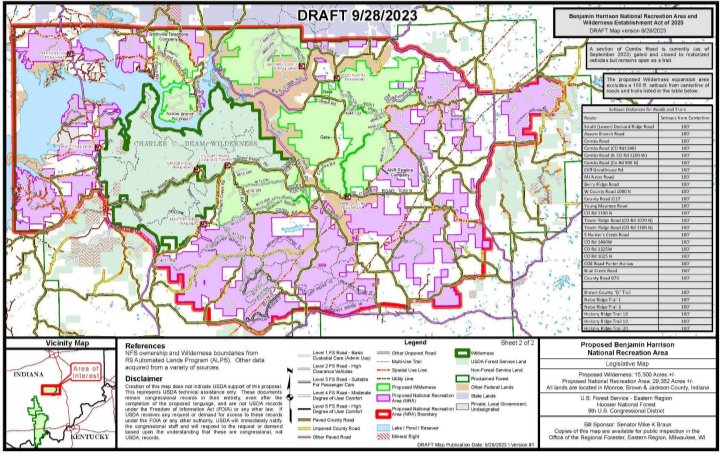Podcast: Play in new window | Download (Duration: 30:47 — 42.3MB)
Subscribe: RSS
This week on Eco Report, Environmental Correspondent Zyro Roze gets an update from Steven Stewart of Indiana Forest Alliance on positive and negative developments affecting climate, habitat, water and air quality in the region as windows of opportunity for public input draw to a close.
And now for your environmental reports:
The Grain Belt Express is a power line that will carry wind energy from Kansas across Missouri and Illinois before hooking into a power grid in Indiana that serves eastern states. This project has taken many years to gain approval for its transmission line.
The $7 billion, 800-mile Grain Belt Express electric transmission infrastructure project secured approval from the Missouri Public Service Commission for its request to amend its existing Certificate of Convenience and Necessity. The decision marks the last required state siting approval for significant enhancements to the project and provides the necessary certainty about power delivery to support ongoing and upcoming commercial contracting efforts.
For Missouri electric consumers, the decision provides certainty of power delivery, billions of dollars in additional energy savings, and increased reliability for major grid regions that serve the Show Me state. Across the route, the states of Kansas, Missouri, and Illinois, the Grain Belt Express will deliver over $11 billion in energy cost savings over 15 years and enhance reliability for millions of homes and businesses in the Midwest and other regions.
—Norm Holy
The switch to electric vehicles is plagued with problems.
Major automakers and governments have vowed that the future of cars is electric. And with transportation making up about a quarter of the carbon pollution emitted by humanity, scientists say phasing out gas- and diesel-powered cars is imperative for there to be any hope of avoiding the worst effects of global warming.
But the shift away from fossil-fuel burning cars is happening too slowly to stave off climate catastrophe, according to a report released by Greenpeace this week. (quote) Leading auto manufacturers, including Toyota, Volkswagen, and Hyundai, are transitioning far too slowly to zero-emission vehicles, which has dangerous consequences for our planet, (end quote) Benjamin Stephan, climate campaigner at Greenpeace Germany, said in a statement. Toyota, Volkswagen and other leading automakers are on a collision course with the climate.
The report closely analyzed the stated electrification plans of four automakers that make up 40% of the world’s cars: GM, Hyundai/Kia, Toyota and the Volkswagen Group. Two of them have set dates to eliminate fossil-fueled cars: GM by 2035, and Kia by 2045.
Toyota and Volkswagen have no target date to go all-electric. VW had previously set 2040 as its target, while Toyota’s CEO has resisted the all-electric push, recently saying the EV transition will take longer than many believe.
EVs and hybrids may be catching on, but they make up only a little more than 2% of all vehicles registered in Indiana. Detractors point out that EVs are expensive – and that they are powered by electricity, which may still be produced from natural gas or coal. It doesn’t seem to matter that wind and solar are cheaper than gas and coal, and do not cause health issues. The Legislature is operating as if our state motto is “coal forever”.
—Norm Holy
This past summer, the Nature Conservancy of Indiana closed on a 360-acre forested property in Monroe County. The forests on this property – adjacent to Lake Monroe, Ransburg Scout Reservation and the Hoosier National Forest – are a stronghold for rare plants and wildlife species, including the tens of thousands of songbirds that migrate from South America every year to breed and raise their young in central and southern Indiana’s hardwood forests. This “home away from home” cannot be replicated or replaced.
This was one of the last and largest privately-owned parcels remaining in the Lake Monroe area, with a high risk for development due to its proximity to both State Road 446 and Lake Monroe. More than a mile of the property borders the Hoosier National Forest. The Nature Conservancy will be working with the U.S. Forest Service to transfer ownership and management of the property within the next five years.
—Julianna Dailey
This past summer, while conducting a routine survey, the Indiana Department of Natural Resources discovered a young Eastern hellbender salamander in south-central Indiana’s Blue River. Over the past three to four decades, no juvenile hellbenders have been documented in the wild in Indiana.
The hellbender, once occurring in most of southeast Indiana’s tributaries to the Ohio River, is now on Indiana’s endangered species list due to habitat loss and polluted waterways. To help improve water quality and save the hellbender – as well as other aquatic species – the Nature Conservancy and partners decided to do something about it. They planted more than a half a million trees along the Blue River, worked with agricultural retailers to promote conservation practices on nearby farmland, and removed two low-head dams, with a third slated for removal in 2024. These efforts are paying off! The discovery of a juvenile means that there is a population healthy enough to reproduce on their own.
—Julianna Dailey
The Yale School of the Environment reports that the renewable energy firm, Savion, is building a 200-megawatt solar installation on a former coal mine on the border of Kentucky and West Virginia. When completed, it will be the largest solar project in Kentucky.
The Martin County Solar Project will stretch across 1,200 acres of the Martiki coal mine, an abandoned mountaintop strip mine. When completed, it will generate enough electricity to power more than 33,000 homes. Construction will kick off next year, and the solar array will go online by early 2024. Most of the workers on the project are expected to be former coal miners, PV Magazine reported.
In 2017, the Kentucky Coal Mining Museum made national news when it decided to cut its power bill by installing rooftop solar panels. Now, solar is taking off in the state. While Kentucky has just 68 megawatts of solar power installed currently, more than 800 megawatts are in the pipeline.
Mountain top sites are ideal for wind or solar. These sites are flat and without topsoil for farming. West Virginia would appear to be attractive for similar development.
—Norm Holy
Feature Report:

And now, we turn to Zyro Roze as he announces that Monroe County is among sixteen counties under a burn ban due to dry conditions and asks Steven Stewart of I.F.A. about threats to health and habitat as well as the positive promise posed by a new United States Senate Bill to establish the Benjamin Harris National Recreation Area and Wilderness which could counter U.S. Forest Service plans to log and burn in the Lake Monroe watershed and across the state.

To follow up on the information and your opportunities to voice opposition or approval, go to: www.indianaforestalliance.org before the public comment period ending Monday.

Are you looking for a way to make a difference on environmental issues?
Here at EcoReport we are currently looking for reporters, engineers, and segment producers. Our goal is to report facts on how we’re all affected by global climate disruption and the ongoing assaults on our air, land and water. We also celebrate ecologists, tree huggers, soil builders and an assortment of champions who actively protect and restore our natural world, particularly those who are active in south central Indiana.
All levels of experience and all ages are welcome, and we provide the training you’ll need. W-F-H-B also offers internships.
And now for some upcoming events:
Join park expert, bird enthusiast, and NPR’s “Moment of Science” radio personality Don Glass at Brown County State Park on Saturday, November 18th, from 11 to 11:45 am to learn about the Woodpeckers of Indiana. The presentation will discuss Indiana’s 7 species, what they look like, their behaviors and more. Meet in the Nature Center.
Enjoy a Here Kitty Kitty Talk at McCormick’s Creek State Park on Sunday, November 12th, at 3:30 pm in the Nature Center. You won’t be learning about little kitties, but all about the park’s elusive feline residents focusing on bobcats.
Experience Whooper Wednesday every Wednesday until February 21st, at Goose Pond Fish and Wildlife Area on Wednesday, November 22nd, from 8 to 9:30 am. The morning bird walk will let you spot resident winter birds, including the endangered Whooping Cranes. Dress for the weather.
Forget about shopping and holiday stress at the 4th Annual Monroe Lake Holiday Hiking Challenge. Hike all of Monroe Lake’s trails and complete the challenge activities beginning on Thursday, November 23rd, for an opportunity to win a prize. You have 4 days to complete the challenge which ends on November 26th.
If you love full moon hikes, then plan to join Anthony for a 1-mile hike on Trail 5 for a Full Beaver Moon Hike at Spring Mill State Park on Saturday, November 25th, from 8 to 9 pm. Learn the history and folklore of the Full Beaver Moon. Dress for the weather.
Credits:
This week’s headlines were written by Norm Holy and Julianna Dailey
Today’s news feature was produced by Zyro Roze and edited by Noelle Herhusky-Schneider.
Julianna Dailey assembled the script which was edited by Zyro Roze.
Julianna Dailey compiled our events calendar.
Kade Young and Noelle Herhusky-Schneider produced today’s show.
Branden Blewett is our engineer.
 WFHB Bloomington Community Radio
WFHB Bloomington Community Radio


